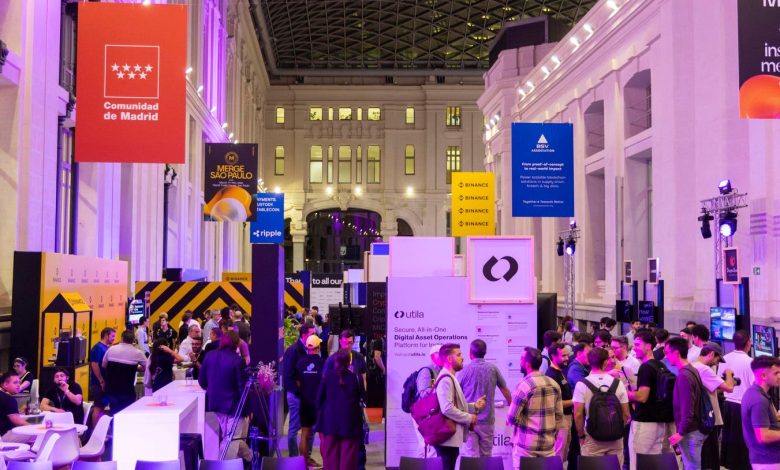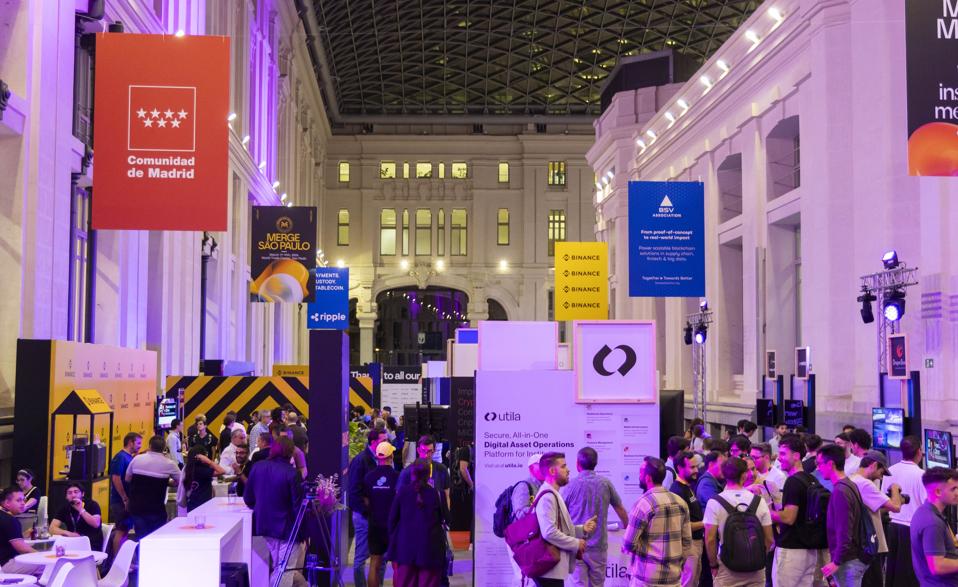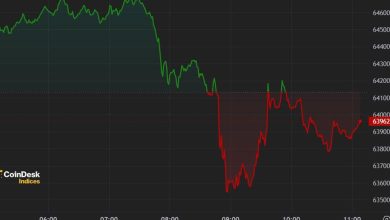Merge Madrid Positions Spain’s Capital as Europe’s Next Crypto Hub

Merge Madrid 2025, celebrated in Palacio de Cibeles in Madrid.
Merge Madrid
Europe is building its own Bitcoin, crypto, and Web3 strategy. Among the different cities on the continent, there’s one where entrepreneurs, companies, public servants, and enthusiasts are starting to build a hub: Madrid. Spain’s capital is one of the under-the-radar crypto places, and last week it hosted an important event that showed how its potential could soon reach full capacity: Merge Madrid.
Among the attendadts we saw key industry leaders, established companies, startups, central bankers, authorities, and representatives from both the local government of Madrid and the Comunidad de Madrid. Every different sector was represented in this conference, held from October 7 to 11, featuring several activities, panels, and keynotes. The event had three different parts: one focused on institutions, the conference itself, and a tech day in collaboration with IE University.
On Tuesday, Merge held its Institutional Summit in the scenic Palacio Santoña, with representatives from banks, public and private institutions, venture capitalists, and even regulators. Stablecoins, new Web3 applications, real-world assets, and tokenization were among the topics, with big names like Central Bank of Spain, Mastercard, BBVA, Santander, Caixabank and Binance among the participants.
“Merge confirms a clear trend we’ve been seeing for two years: the convergence between crypto and traditional finance is no longer a hypothesis; the focus now is on how to integrate payments with stablecoins, tokenization, and new security models in a responsible, interoperable, and sustainable way,” Head of Binance for Spain and Portugal, Javier García de la Torre, told me in an interview.
On Wednesday, the main conference started. According to Paula Pascual, Founder and CEO of Merge, having this kind of space in Spain is “essential”.
“You can’t imagine that here are Central Bankd of Spain representatives, people from the Central Bank of Chile, talking about how they see the future of money. I think it’s essential to hold these kinds of events for several reasons, but mainly so these institutions can disclose to the general public how they’re working on crypto and underscoring that it’s not just the same as a scam or fraud,” Pascual told me in an interview.
The main conference took place in Palacio de Cibeles, one of the most iconic buildings in Madrid. There were four different stages that hosted discussions from many different points of view. The goal of Merge is, as its name suggests, to combine all the key actors’ visions and interests around these technologies to build together.
Madrid: The Convergence of the Hispanic Heritage
One interesting element of this conference was how connected entrepreneurs and companies from the Hispanic world are. Several companies and projects from Latam participated in the event. That was the case of the Panamanian bank Towerbank. This bank is a trailblazer in crypto products in the region, and according to its Head of Digital Assets, Gabriel Campa, the idea is to connect Europe with Latin America to further understand how the European experience could enrich what’s being done there.
“I think it’s a great idea to unite Europe with Latin America. We need more connections between the two continents, and these events do help. Everyone knows that Europe is very advanced with the topic of crypto and regulation. The banks are already starting to see this more in-depth compared to the rest of the world. And being able to listen to the big banks of Europe and their approach is critical. How are they handling it? What are they doing? How do they see the regulation?” Campa detailed in an interview.
For Campa, listening to what Spanish, German, or European banks in general have to say is a good guide for the rest of the banks. “In the end we are all regulated institutions, everyone has to follow the same rules. Some more than others, but in general, our rules are very similar. So, to know how they are doing it, how they are entering the regulated crypto world as newcomers, and know how to do it well is important. Because in the end, everyone is going to do it. We can’t afford to do it wrong,” Campa concluded.
Besides Towerbank, the Chilean exchange OrionX, the Mexican exchange Bitso, the Colombian digital wallet Meru, and the Argentinian Bitcoin-native stock exchange Roxom were among the Latin American representatives at this event.
Women Inclusion and Initiatives Took Place at Merge Madrid
On Thursday, the Association for Women in Cryptocurrency hosted a women-led panel titled “Regulation and Innovation: Women Leading on Web3”, showcasing success stories from entrepreneurs and leaders in the industry. The panelists discussed regulation, compliance, and the overall experience of the impact of these technologies on the world. After the panel, they held a networking brunch to further connect the community.
“The idea of AWIC since it was born is just that it’s not an association for women, it’s an association that encourages and promotes the inclusion of women in leadership roles and gives them visibility, but there are many male members in it. So we have what we call allies who are men; you must have seen there were men at the brunch, and many of them are also members of the association,” lawyer and AWIC ambassador Sol Cinosi explained to me in an interview.
“We would never exclude them because the idea is to integrate and make sure there is visibility for everyone, not only women,” Cinosi concluded.
University and Academia Had Their Space at Merge Madrid
On Friday, and as a closing side event, Merge Madrid hosted a series of educational activities and workshops. These activities were held at IE Tower, in La Castellana. I spoke with the Academic Director of the Master in Business Analytics and Data Science, Raquel Cabero Quiles. For her and for IE University, participating in these kinds of events is key to maintaining the innovative approach of the university.
“Our programs maintain a strong focus on industry connections, and hosting strategic events like this allows us to bring together top executives, leading financial institutions, and innovative startups shaping the future of finance. This gives our students first-hand exposure to the latest trends, technologies, and opportunities in the professional world, especially as many of our programs and students are deeply engaged with the fields of blockchain, Web3, and digital assets,” Cabero explained to me in an interview.
And these aren’t just words. In fact, according to Cabero, the IE School of Science and Technology is launching a new Master in Financial Technology starting in September 2026, which includes courses in Web3, blockchain, cryptocurrencies, and virtual assets.
“In addition, the Master in Business Analytics and Data Science offers a FinTech concentration, with a course specifically focused on these topics. These areas are also covered in some of our undergraduate programs. We also have a dedicated research and innovation hub, the IEX Center, which brings together leading global researchers, outstanding IE students and faculty, and high-profile industry and tech ventures,” Cabero concluded.
Madrid Is Also a Bitcoin City
Just a few days before Merge Madrid, there was another conference, but this one was more focused on Bitcoin: Watch Out! Bitcoin, which arrived at its fourth edition. The conference topics were very different from those found at Merge.
For instance, instead of regulations and compliance, Watch Out! Bitcoin focused on Bitcoin’s technology, how it can impact the power relations between the individual and the state, and even the implications it could have for artificial intelligence or the risks that quantum computing could imply for it. The majority of attendees at this event were very cautious about their privacy, and even the organizers use pseudonyms. Photographs were forbidden as a rule, and social media posts showed only what happened on stage.
Even with their different approaches, both Merge Madrid and Watch Out! Bitcoin underscore the importance Madrid is gaining as a Bitcoin and crypto hub in Europe.





